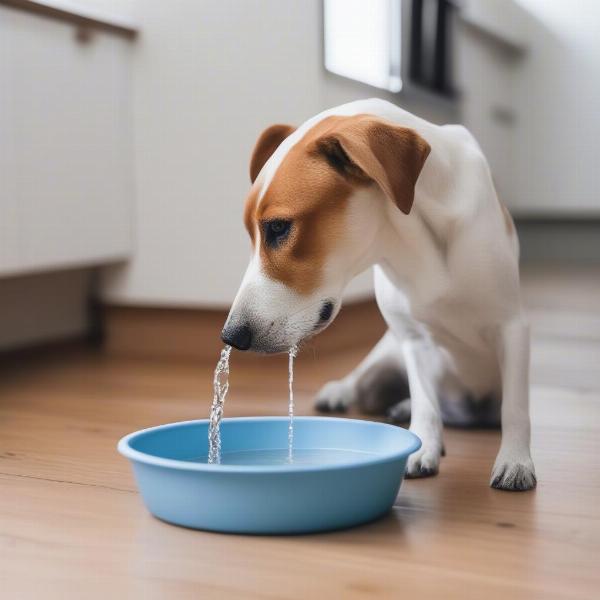Dixie Dog Menu isn’t a standardized or universally recognized term in the canine world. It’s likely a colloquialism referring to a dog’s diet or perhaps a specific brand or type of dog food. Understanding what constitutes a healthy and balanced “Dixie Dog Menu,” therefore, requires us to delve into the fundamental principles of canine nutrition. Let’s explore how to create a nourishing and enjoyable meal plan tailored to your dog’s individual needs.
Decoding the “Dixie Dog Menu”: Building a Balanced Diet
While the term “Dixie Dog Menu” might be open to interpretation, the core principles of a healthy canine diet remain constant. A balanced “Dixie Dog Menu” should encompass high-quality protein sources, healthy fats, carbohydrates, vitamins, and minerals. Just like humans, dogs require a variety of nutrients to thrive. The specific proportions of these nutrients will depend on your dog’s age, breed, activity level, and any underlying health conditions.
Protein, essential for muscle growth and repair, should form the foundation of your “Dixie Dog Menu.” Excellent sources include lean meats like chicken, beef, lamb, and fish. Healthy fats provide energy and support skin and coat health. These can be found in fish oil, flaxseed oil, and chicken fat. Carbohydrates offer another source of energy and fiber, which aids in digestion. Brown rice, sweet potatoes, and oats are good choices.
Tailoring the “Dixie Dog Menu”: Considering Individual Needs
Creating a truly personalized “Dixie Dog Menu” requires taking your dog’s individual characteristics into account. A young, active puppy will have different nutritional requirements than a senior dog. Large breeds may need specific joint support supplements, while smaller breeds might benefit from smaller kibble sizes.
Furthermore, certain health conditions may necessitate dietary adjustments. Dogs with allergies might require specialized hypoallergenic foods, while those with diabetes may need a low-glycemic diet. Consulting with your veterinarian is crucial to determine the best “Dixie Dog Menu” for your dog’s specific needs. They can help you assess your dog’s health, activity level, and any existing conditions to formulate a tailored feeding plan.
Beyond the “Dixie Dog Menu”: Feeding Practices and Considerations
Beyond selecting the right food, implementing healthy feeding practices is equally important. Establishing a regular feeding schedule helps regulate your dog’s digestion and prevents overeating. Always provide fresh, clean water to ensure proper hydration. Avoid feeding table scraps, as many human foods are toxic to dogs.
 Dog Drinking Water
Dog Drinking Water
Conclusion: Crafting the Perfect “Dixie Dog Menu”
While “Dixie Dog Menu” might not be a formal term, it highlights the importance of a well-planned diet for your canine companion. By understanding the principles of canine nutrition and considering your dog’s individual needs, you can create a balanced and delicious “Dixie Dog Menu” that promotes optimal health and well-being. Remember to consult with your veterinarian for personalized guidance and address any specific dietary concerns.
FAQ:
- What is a “Dixie Dog Menu”? It’s a colloquialism likely referring to a dog’s diet plan. A balanced one should include protein, fats, carbohydrates, vitamins, and minerals.
- How much should I feed my dog? Portion sizes depend on your dog’s age, breed, size, activity level, and health. Consult your vet for guidance.
- Can I feed my dog table scraps? Many human foods are toxic to dogs. It’s best to avoid table scraps and stick to a balanced dog food.
- What are good sources of protein for dogs? Lean meats like chicken, beef, lamb, fish, and eggs are excellent protein sources.
- What if my dog has allergies? Consult your vet. They can recommend hypoallergenic dog food formulas tailored to your dog’s needs.
- How often should I feed my dog? Most adult dogs thrive on twice-daily feedings. Puppies may require more frequent meals.
- Why is fresh water important? Water is essential for hydration, digestion, and overall health. Always provide access to clean, fresh water.
ILM Dog is your trusted resource for expert advice on dog care and nutrition. We offer a wide range of resources, from breed selection guides to health and training tips, to help you navigate the wonderful world of dog ownership. We specialize in Dog Breeds and Selection, Dog Health and Medical Care, Dog Training and Behavior, Dog Nutrition and Feeding, Dog Grooming and Hygiene, and Dog Products and Accessories. Contact us today for personalized support: Email: [email protected], Phone: +44 20-3965-8624. Visit ILM Dog for more information.